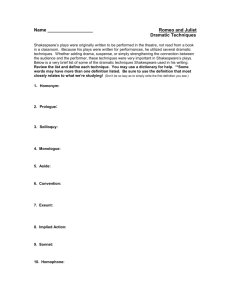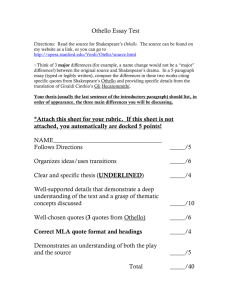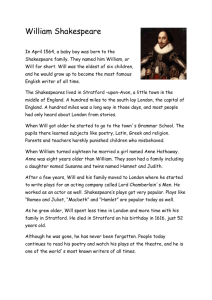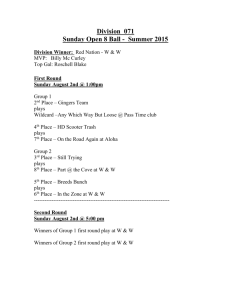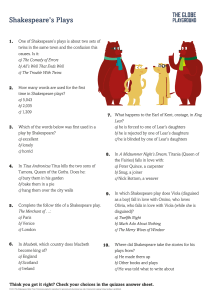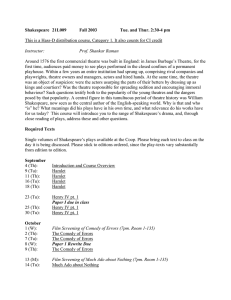21L. 009: Shakespeare Professor Shankar Raman I give two options: specific
advertisement
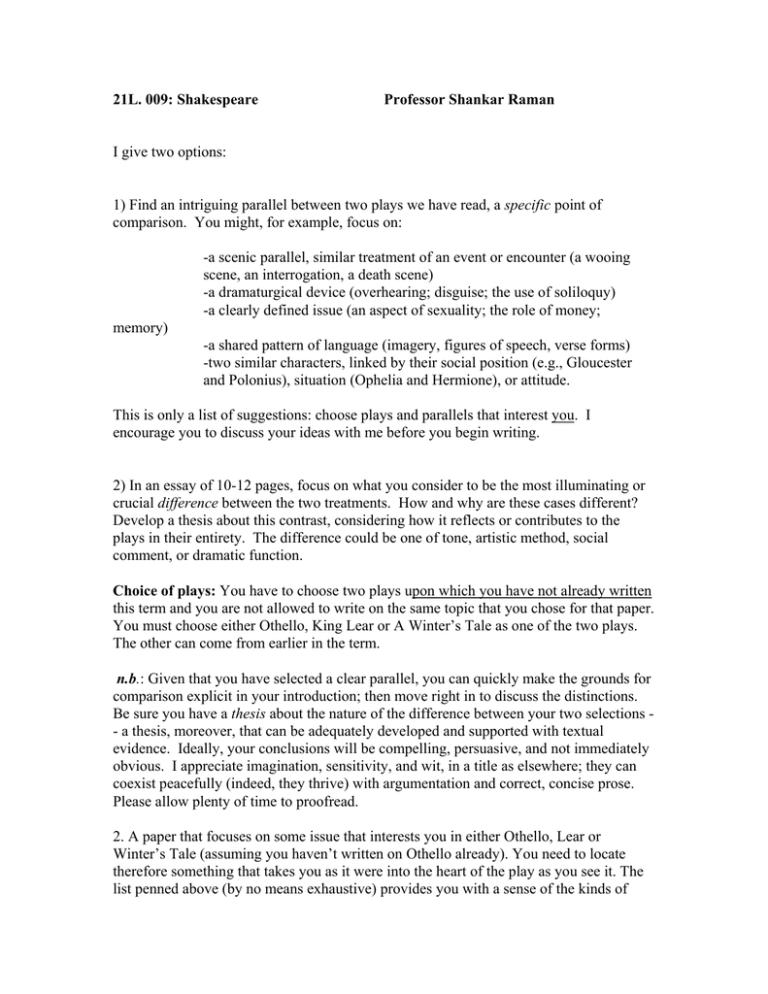
21L. 009: Shakespeare Professor Shankar Raman I give two options: 1) Find an intriguing parallel between two plays we have read, a specific point of comparison. You might, for example, focus on: -a scenic parallel, similar treatment of an event or encounter (a wooing scene, an interrogation, a death scene) -a dramaturgical device (overhearing; disguise; the use of soliloquy) -a clearly defined issue (an aspect of sexuality; the role of money; memory) -a shared pattern of language (imagery, figures of speech, verse forms) -two similar characters, linked by their social position (e.g., Gloucester and Polonius), situation (Ophelia and Hermione), or attitude. This is only a list of suggestions: choose plays and parallels that interest you. I encourage you to discuss your ideas with me before you begin writing. 2) In an essay of 10-12 pages, focus on what you consider to be the most illuminating or crucial difference between the two treatments. How and why are these cases different? Develop a thesis about this contrast, considering how it reflects or contributes to the plays in their entirety. The difference could be one of tone, artistic method, social comment, or dramatic function. Choice of plays: You have to choose two plays upon which you have not already written this term and you are not allowed to write on the same topic that you chose for that paper. You must choose either Othello, King Lear or A Winter’s Tale as one of the two plays. The other can come from earlier in the term. n.b.: Given that you have selected a clear parallel, you can quickly make the grounds for comparison explicit in your introduction; then move right in to discuss the distinctions. Be sure you have a thesis about the nature of the difference between your two selections - a thesis, moreover, that can be adequately developed and supported with textual evidence. Ideally, your conclusions will be compelling, persuasive, and not immediately obvious. I appreciate imagination, sensitivity, and wit, in a title as elsewhere; they can coexist peacefully (indeed, they thrive) with argumentation and correct, concise prose. Please allow plenty of time to proofread. 2. A paper that focuses on some issue that interests you in either Othello, Lear or Winter’s Tale (assuming you haven’t written on Othello already). You need to locate therefore something that takes you as it were into the heart of the play as you see it. The list penned above (by no means exhaustive) provides you with a sense of the kinds of things you might think about. Once you have located a topic or area of interest, develop an argument regarding the play that examines the play in the light of the chosen issue. Remember, you have to have a clear and coherent argument to make. Sit down and write a detailed outline if necessary, so that you have a sense of what you want to say and how you want to say it. Some questions you might pursue (rather randomly chosen): •How does the play treat the issue of siblings? Are sisters like brothers? •What kind of status and function to subordinate families have? Think of the Polonius family in Hamlet, for example, or the Gloucester family in Lear. • What is Shakespeare’s sense of the family? Is it the same in the Comedies as int the Tragedies? • Why are mothers so often missing and/or problematic? • The relationship between tragedy and comedy. • The theme of time and timing in one of the plays • The clash between Christian and pagan motifs. What one might make of the language of redemption, for example? Length: 10-12 pages, due in class, Friday December 5th As you know, this due date is set based on Hass-D requirements for courses with finals. Threfore, while I do no object to giving extensions, I can only do so on an individual basis. If you need an extension, please discuss the situation and get my permission first. Papers turned in late without my prior consent will be down-graded. And, as usual, my injunctions in earlier assignments regarding plagiarism remains in force. If you borrow ideas from elsewhere, or use language from other sources, you are expected to acknowledge explicitly in footnotes or bibliography the nature of your reliance. Such acknowledgement needs to be made not just for direct quotation, but for paraphrasing the ideas of an external source as well.



